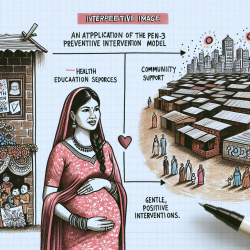Introduction
In the realm of adolescent health, the intersection of obesity and bullying is a critical area that demands our attention. The research article titled "Association between body mass index and health outcomes among adolescents: the mediating role of traditional and cyber bullying victimization" provides insightful data that can guide practitioners in improving outcomes for children. By understanding the mediating role of bullying victimization, both traditional and cyber, in the relationship between body mass index (BMI) and health outcomes, we can better support our youth.
The Research Findings
The study utilized a nationally representative sample of 10,160 school children to explore the direct and indirect effects of BMI on physical and psychological distress. The findings highlighted that both traditional and cyberbullying victimization play significant roles in mediating the relationship between BMI and health outcomes. Specifically, traditional bullying was found to exacerbate both physical and psychological distress among overweight and obese adolescents. Interestingly, while cyberbullying also mediated psychological distress, it did so in a negative manner, suggesting a complex interaction that warrants further exploration.
Implications for Practitioners
For practitioners working with adolescents, these findings underscore the importance of addressing bullying as a component of health interventions for overweight and obese youth. Here are some practical steps practitioners can take:
- Awareness and Education: Educate school staff, parents, and students about the impact of weight-based bullying. Awareness campaigns can help reduce stigma and promote a more inclusive environment.
- Early Identification: Implement screening tools to identify students who may be victims of bullying. Early intervention can prevent the escalation of distress and improve health outcomes.
- Supportive Interventions: Develop support groups and counseling services for victims of bullying. Providing a safe space for adolescents to share their experiences can foster resilience and coping strategies.
- Collaborative Efforts: Work with school administrators to create policies that address bullying and promote a culture of acceptance and respect for diversity in body size.
Encouraging Further Research
While this study provides valuable insights, it also highlights areas where further research is needed. Understanding the negative mediating role of cyberbullying on psychological distress is crucial. Researchers should explore the nuances of online interactions and how they impact adolescents' mental health. Additionally, longitudinal studies could provide a deeper understanding of how these dynamics evolve over time.
Conclusion
Addressing the dual challenges of obesity and bullying requires a comprehensive approach that involves educators, health professionals, and families. By leveraging data-driven insights and fostering supportive environments, we can empower adolescents to overcome these challenges and thrive. To read the original research paper, please follow this link: Association between body mass index and health outcomes among adolescents: the mediating role of traditional and cyber bullying victimization.










